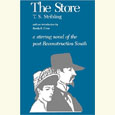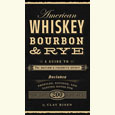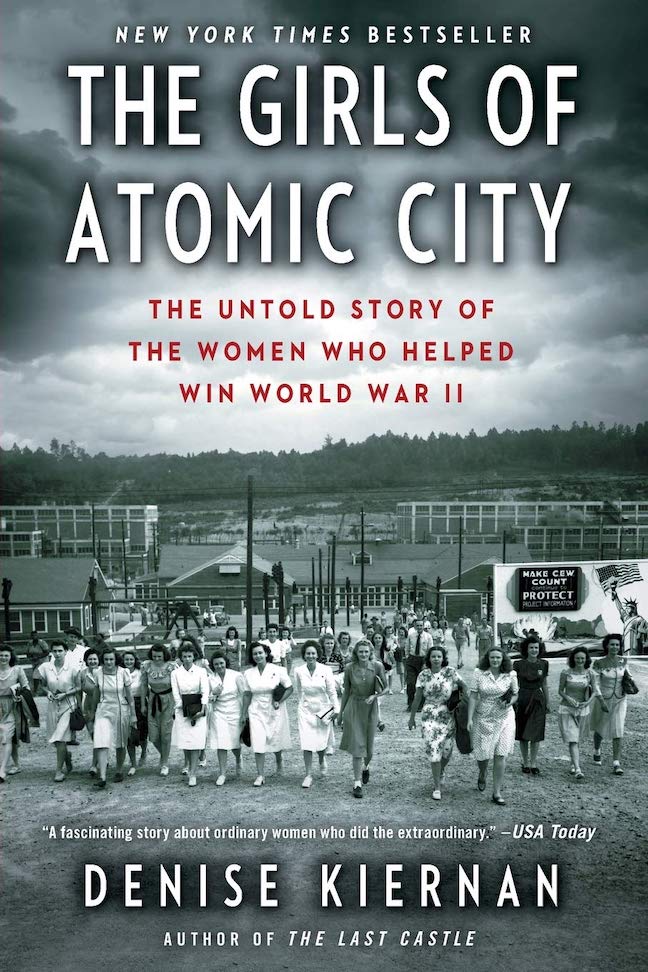"It's a Gift I Want to Give the City I Love"
Ann Patchett and Karen Hayes talk with Chapter 16 about their new bookstore—Parnassus Books
Last Wednesday, novelist Ann Patchett appeared on NPR’s The Diane Rehm Show to discuss her new novel, State of Wonder. It was in many ways a routine discussion about a much-anticipated book by the bestselling author of Bel Canto and Truth & Beauty (among many others), but nearly an hour into the conversation, Patchett casually dropped a bombshell: she and a business partner, former Random House sales rep Karen Hayes, were about to open a new bookstore in Nashville, a city that has been without one for the last six months. “We have used bookstores, but the closest Barnes & Noble is twenty miles outside of town,” Patchett told Rehm. “I don’t know if I’m opening an ice shop in the age of Frigidaire, but I can’t live in a city that doesn’t have a bookstore.”
“We will be Nashville’s Parnassus by providing a refuge for Nashvillians of all ages who share in the love of the written word.” —mission statement for Parnassus Books
The new store will be called Parnassus Books. Though Hayes and Patchett have not settled on a location yet, the mission statement Hayes has written for the store is clear: “Mt. Parnassus in Greek mythology is the home of literature, learning, and music. We will be Nashville’s Parnassus by providing a refuge for Nashvillians of all ages who share in the love of the written word. We will partner with and support local writers and artists, businesses and institutions. We will strive to bring readers the best books in literature, non-fiction, children’s books, local interest, and the arts in both printed and digital formats. We will provide venues for writers to connect with readers, and readers to connect with books. By doing this we hope to complement and add to the rich cultural character of the Athens of the South.”
On Thursday, news sites and literary blogs and Facebook pages and Twitter feeds were buzzing, and Nashvillians—those, at least, who could actually bring themselves to believe the news—were giddy: short-story writer Lydia Peelle called Patchett a “literary superhero.” Novelist Adam Ross observed that Patchett and Hayes “have rescued the Nashville literary community from the edge of despair.” “Sounds to me like Nashville’s about to get its soul back,” noted nonfiction author David Dark. (Click here for more reactions from Nashville authors.)
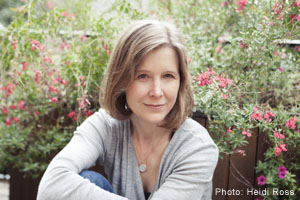 On Friday Chapter 16 caught up with Hayes and Patchett separately—Hayes was finishing her last day as a sales rep for Random House, and Patchett was in a car leaving a Boston bookstore, where she had given a reading—and talked with them by phone about their plans for Parnassus Books and about the story behind the store. (To avoid repetition, the interviews have been spliced together, but no words have been changed in the process.)
On Friday Chapter 16 caught up with Hayes and Patchett separately—Hayes was finishing her last day as a sales rep for Random House, and Patchett was in a car leaving a Boston bookstore, where she had given a reading—and talked with them by phone about their plans for Parnassus Books and about the story behind the store. (To avoid repetition, the interviews have been spliced together, but no words have been changed in the process.)
Chapter 16: Ann, it must be pretty hard to launch a book and a bookstore in the same season.
Patchett: Yeah, I can’t even remember being quite this pressed before. And on one hand this is really bad timing because I’m not home, and it puts pressure on Karen. I mean, I said to her, “Do you want me to talk about this on book tour? I’m going to be doing this media-heavy moment.” And she said, “Wow, it’s a little early, but if this is the chance, then this is the chance.”
Chapter 16: In an email to me, you characterized Karen as the “brains” behind Parnassus, but you’re clearly the face of the operation: “Ann Patchett’s Bookstore” is the headline all over the Nashville news right now.
Ann Patchett: I said to Karen before we went out with all of this, “I feel so uncomfortable because I don’t want to be taking the glory while you’re home doing the hard work and crunching the numbers, and looking at spaces, and all that.” And she said, “Take it! Run with it!”
“I still really believe in this, and I think it’s a business that can work on a human-sized scale.” -Ann Patchett
I think it is a good and valuable thing, being able to bring national attention both to our bookstore and to the state of independent bookstores, and being able to stand up and say, “Hey, I still really believe in this, and I think that it’s a business that can work on a human-sized scale.” I think bookstores are not dead or dying. I think bookstores could always work when they’re the size of a bookstore instead of, say, the size of Macy’s. There were always plenty of people buying books in Davis-Kidd and in Borders, but 30,000 square feet is too much bookstore.
So what’s my role? My role is to bring attention to our store and also to independent bookstores everywhere, and to be supportive of Karen’s vision because she has thought it through with so much care and intelligence. After Davis-Kidd closed, when I thought of opening a store of my own, I just came up against a wall so fast because—for as much of my life as I’ve spent in bookstores—I don’t know about how they run, and she does. So for both of us, this is a very, very good marriage; we’re both bringing something that the other one needs. She’s bringing all of the sense and work, but I can bring the flash.
Chapter 16: So how did this partnership come about?
Karen Hayes: Ann and I didn’t really know each other; we met for the first time a long ago, but our paths had really never crossed. Then we ran into each other in late January or early February at a Magdalene party, and we were talking about how after Davis-Kidd closed we each wanted to open a bookstore but had shelved the idea—she’s already got a full-time job, and I couldn’t afford it. I was making a decent living at Random House, but hopping into a business with no support is hard because you’re not going to make money the first year at least, and I needed to make money.
“This is the future of the book business: a neighborhood bookstore, something that is part of the community and that tailors itself to serving the community.” —Karen Hayes
And then in late February, Random House offered early retirement to employees over fifty, and I thought, This is my opportunity. I’ll have close to a year’s salary to support me [as I start] a bookstore. I won’t have to draw a salary from the store. So I talked to Mike Zibart and told him what I was thinking of, and when he interviewed Ann for BookPage, he mentioned that I was exploring the idea of opening a bookstore, and she said, “She should contact me.”
So I did. We talked over lunch, and she said, “I really want to join you. I want to partner with you.”
Chapter 16: Ann has said that her own motivation in wanting to start a bookstore was simply the desire for Nashville to have a bookstore again after Davis-Kidd closed. What about you, Karen? Has this always been a dream of yours?
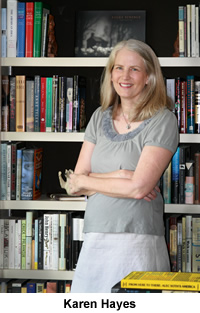 Hayes: No, not at all. For so many years, independents have been having such a hard time. I’ve called on a lot of independent bookstore owners [since making this decision], and they’ve all said, “You’re crazy, but we’re glad you’re joining us.” So, no, it was not something I was thinking of, but when Davis-Kidd closed, a friend said to me, “You should open a bookstore.” And I said, “You know, you’re right. It’s time for the independents to come back.” This is the future of the book business: a neighborhood bookstore, something that is part of the community and that tailors itself to serving the community, which the chains cannot do. So I thought, Of course. That’s the next thing for me.
Hayes: No, not at all. For so many years, independents have been having such a hard time. I’ve called on a lot of independent bookstore owners [since making this decision], and they’ve all said, “You’re crazy, but we’re glad you’re joining us.” So, no, it was not something I was thinking of, but when Davis-Kidd closed, a friend said to me, “You should open a bookstore.” And I said, “You know, you’re right. It’s time for the independents to come back.” This is the future of the book business: a neighborhood bookstore, something that is part of the community and that tailors itself to serving the community, which the chains cannot do. So I thought, Of course. That’s the next thing for me.
Chapter 16: Ann, you’ve made it clear in other interviews that your desire to start a bookstore was really more a desire to have a bookstore nearby than a desire to run one. So this is more of a financial investment for you? You’re not planning to give up your day job?
Patchett: To me, it’s like the gift I want to give my city, the city that I love. I love Nashville, and I know that people want an independent bookstore. In terms of giving money to something that I believe in, I believe in having a bookstore.
But it is [also] really weird to have a book and not have a place to sell it in your hometown. Months ago, the Beveled Edge, the frame store, called me and said, “Do you want us to carry your book?” And I said, “God, I would appreciate it so much!” Because I’d like to be able to say to my friends, “Go to the Beveled Edge; you can buy my book.” I’ve been shopping there since I was in high school, and they were just offering a good customer a place for her book.
Chapter 16: Have you thought at all about what your day-to-day role might be once the store is open?
Patchett: My joke is that I’ll giftwrap. I’m really good at it. And, actually, I sort of mean that. I can definitely see myself being in there when things are busy, when somebody’s sick.… But will I have a regular shift? No. I don’t want to do anything to get in Karen’s way. I don’t see myself coming down and saying, “Oh, I want this architect and not that architect,” or “I think the cash register should be there.” I really do see my job as supporting her vision—which is an excellent, excellent vision.
Chapter 16: Karen, rumors are swirling in town that the store will be in the space the old Belle Meade Cafeteria occupied. True?
Hayes: That’s one of the spaces that we’re looking at, [but] we’re looking at a whole range of possibilities—from about 2,000 square feet to about 5,600. We did look at the Belle Meade Cafeteria, and there are plusses and minuses to that space. I love the location, and I love the idea of reinventing a space that has meant so much to so many people, but it’s a big space—5,600 square feet—and it needs a lot of work, so the startup costs for would be huge. It’s still under consideration, but it’s not at all set in stone.
Chapter 16: But you’re looking at that side of town? Somewhere in the Davis-Kidd neighborhood, in other words?
Hayes: Yes. We’re drawing a big circle around Green Hills—from 12South over to Belle Meade—because we know that that works. Davis-Kidd had its problems, but its parent company was the [real] problem [not its location or management].
Chapter 16: Wherever it is, you’re talking about a small store—nothing on the 30,000-square-foot scale of Borders of Davis-Kidd?
“These are the books that we love. These are the books we want to recommend, and put in your hand, and connect you to.” —Ann Patchett
Patchett: I just came from Greenlight Books in Brooklyn, and it’s a gorgeous store, and it’s 2,000 square feet. And I thought, “Wow, 2,000 square feet, properly designed, is plenty of space.” You can’t have every book, and I think that’s where bookstores went wrong—you know, with these superstores—thinking they could carry every book. And then Amazon showed us what it meant to carry every book. This is about a reflection of taste, and maybe that’s something I’ll be involved in: “These are the books that we love. These are the books we want to recommend, and put in your hand, and connect you to.”
Chapter 16: After eighteen years as a Random House rep, Karen, you’ve seen a lot of different kinds of bookstores. Do you have a sense yet of the kind of store you’re hoping to build?
Hayes: I’ve called on independent bookstores across a huge area—from Cleveland to Kansas City to Austin to the east coast—and they’re just amazing stores. They’re all different, but they all really fit their communities, and that’s why they’ve lasted. So I’ve seen a lot of different ways this can work and, I hope, learned a ton that will allow me to be able to do this.
Patchett: That’s one thing that we both have: we are two women who have been in, between us, probably just about every independent bookstore in the country. We really have a very well-developed sense, I think, of what works and what’s good.
Chapter 16: Is there a particular store that might be a good model for what you’d like to do here?
Hayes: I have several favorites, but the closest to what I have in mind is probably Carmichael’s, in Louisville. They have two small, independent, neighborhood stores that have lasted, even through the arrival of the chains. Other favorites are Square Books and Lemuria in Mississippi, and Malaprops in North Carolina, and BookPeople in Austin, Texas—I could go on and on.
Chapter 16: When you picture this store in your mind, what do you imagine?
Hayes: Well, it will be dictated in part by the space, but I know I want it to have a great look, so that it really showcases the books. And I want it to be a place for families as well as for lovers of literature; children’s books are so vital for a bookstore because that’s one way to reach out to the community and to be part of the community. I want space for people to be able to sit down—I do want chairs and benches, so that people feel comfortable. I’m hoping there can be an opportunity for a café, too, because that does help with making people feel comfortable.
Chapter 16: I know I speak for a lot of readers when I say I hope there will be author events, too. Is it fair to say, Ann, that you have a lot of friends who might be willing to come to Nashville to give a reading?
Patchett: Much more important than that, I have a lot of editor friends, and I have a lot of publicist friends. The writer very rarely gets to make that decision, but it’s true that there are a lot of people in the business that I can call and say, “Hey, we really want you to come to Nashville; we want you to come to our store.” And I think people will. I’m going to Louise Erdrich’s store in Minneapolis next week—Birchbark Books. There’s a precedent for this.
Chapter 16: Apart from literary fiction and children’s books, what kinds of books do you foresee stocking?
“I’ve called on independent bookstores, and they’re all different, but they all really fit their communities, and that’s why they’ve lasted.” —Karen Hayes
Hayes: It’s going to be a general bookstore. There’s certainly going to be commercial fiction, too. We’ll have cookbooks; we’ll have some spirituality and religion; we’ll have great nonfiction, history—and I’m hoping that because we’re in Music City I can highlight that in the store. A lot of our great musicians are writers themselves, and I want cater as much to the music community as I can—maybe develop some partnerships, team with maybe the Bluebird or Grimey’s. It’s all pie in the sky right now because I haven’t had time to talk to anybody or explore those possibilities, but I love Grimey’s, and I consider them an incredible model for how you can survive in the world as an independent.
Chapter 16: What about lotions, stuffed animals, tea?
Hayes: Definitely we’ll have some sidelines—you have to, to survive these days—but what I’d like to do is concentrate on local businesses: Thistle Farms, Loveless Café. And there are going to be toys in the kids’ section. The rule of thumb is usually 80:20 [books to sidelines], and that’s what I’m going to try to do.
Chapter 16: You surely know that there are many passionate readers in Nashville. Is there a way for them to help support the store now, even before it opens?
Hayes: The budget is really, really tight; I budgeted for just a 2,000-square-foot store. It’s hard to open a store: it costs money to build the shelves and to stock the inventory. So I’m hoping that through a membership rewards program with different levels of commitment and different levels of rewards, we can go a bit bigger because I know this city can support a bigger store, and I’d hate to get stuck in a small space. It just depends on how much the community wants to participate.
Patchett: And I think that’s so smart, not only financially, but just in terms of saying, “You want this? Get involved. Know that you have a stake in this. Know that this is a real community project.” I mean, basically every bookstore is a not-for-profit; nobody’s going to be making big money on this. We’re going to need the community to make a choice, to not get cheaper books on Amazon, because they want to have a bookstore. You want to have a bookstore? Support your bookstore.
Chapter 16: Do you have a target launch date?
Hayes: I’m really, really hoping it will be before the holidays because that’s such a great time to start, and [ideally] a couple of months before the holidays so that we can get some kinks ironed out. It’s going to be hard, but that’s what we’re going to try to do.
To read an excerpt from Ann Patchett’s just-released novel, State of Wonder, click here, and here to read Chapter 16’s interview with Patchett about the book.
